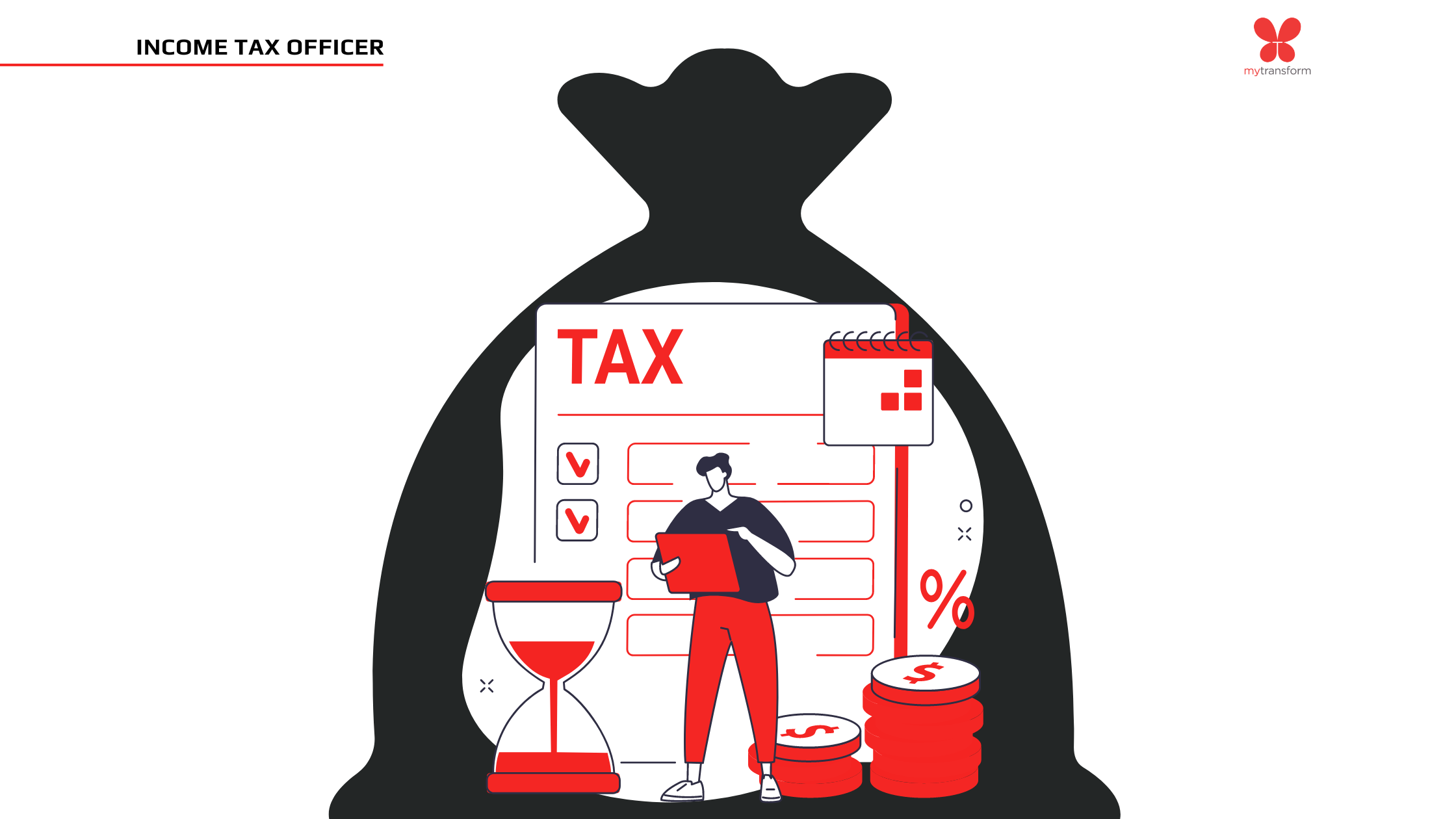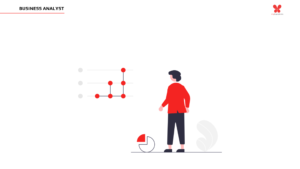
These days, young people are primarily interested in working for the government. Following graduation, they begin looking for government jobs that match their skill set or preferences.
One of those government jobs is that of an Income Tax Officer (ITO). The most prestigious job offered by the central government through examinations is that of an income tax officer.
In this article, you will learn about “How to Become an Income Tax Officer in India,” eligibility criteria, exams, the role of an income tax officer, and many more.
Read the article completely to understand the entire process of becoming an income tax officer.
Who Is An Income Tax Officer?
The Income Tax Officer, often known as the ITO, works for the Income Tax department of the Indian government. The Central Board of Direct Taxes is in charge of this position.
ITO is a position that is supposed to be respectful, but it also instills fear in the public. Especially for those who conceal their income from the government and avoid paying taxes.
Whatever black money the ITO seizes is used to run government institutions. If an individual, organization, or business, fails to file their ITR or files the incorrect ITR, the ITO has the authority to raid their account.
How To Become An Income Tax Officer?
To become an income tax officer, the first thing you must do is complete your bachelor’s degree. Then there are two major examinations in India: the SSC CGL Examination and the JEE Main Examination.
The SSC CGL exam is held for Grade B and Grade C inspectors for the central government’s department of income tax.
We will walk you through the eligibility criteria, examination structure, and selection process that will lead you to your dream.
Let’s get started.
1. Get a bachelor’s degree
To become an ITO, any graduate must pass the SSC-CGL exam. This exam consists of two parts: a written examination and an interview, followed by physical and medical fitness tests.
2. Meet the eligibility criteria
To become an IPO, you must pass the SSC-CGL exam. Also, make sure to meet the following requirements.
-
- Qualification: To become an ITO, you must have a bachelor’s degree from any university and from any stream.
-
- Age: To apply for the position of Income Tax Inspector through the SSC-CGL exam, you must be between the ages of 18 and 27.
-
- Income Tax Officer Age Relaxation Criteria: Only those in the Reserve category are eligible for Age Relaxation in this exam.
The criteria for age relaxation is that – Schedule caste, schedule tribe, and PWD candidates get 10 years of age relaxation, while OBC candidates get 3 years.
3. Apply for the SSC-CGL exam
The online registration process for the SSC CGL 2022 Exam began on September 17, 2022. Now, you can apply online for the SSC CGL 2022 exam by clicking on this link.
Aspirants will be selected for the main examination after passing the SSC CGL or Preliminary exam.
In the preliminary exam, 100 questions from General Intelligence and General Awareness are asked over the course of two hours, and 100 questions from Arithmetic are asked over the course of two hours.
4. Write the tier I exam
Understanding the SSC CGL Exam pattern is essential so that candidates have a clear picture of the types of questions that may be asked in the exam.
The SSC CGL Tier 1 exam is a computer-based objective test (CBT) that is administered online.
The following are some important facts about the SSC CGL Tier 1 exam.
-
- The question will be multiple choice, with four options available and candidates required to select one correct answer.
-
- There will be questions both in English and Hindi. Only the English section will have questions in Hindi.
-
- Tier 1 exams are divided into four sections: General Intelligence and Reasoning, General Awareness, Quantitative Aptitude, and English Comprehension.
-
- There are no sectional breaks. Tier 1 marks will be totaled.
Note A: Objective Type, Multiple Choice Questions will be included in Tier I.
Note B: Except for English Comprehension, the questions will be set in both English and Hindi.
Note C: For each incorrect answer, 0.50 (14) will be deducted.
Aspirants should be aware that there is no penalty for questions that are not attempted. If they are unsure of the correct answer, it is better not to attempt the questions than to give the incorrect answer, which may result in a mark deduction.
Candidates must meet the Tier 1 SSC CGL Cut Off to be shortlisted for Tier 2.
The cut-off is released shortly after the examination is completed successfully. Candidates can review the SSC CGL Tier 1 Analysis to better understand the exam pattern and the difficulty level of the questions.
5. Write the tier II exam
Paper 1, Paper 2, and Paper 3 will make up the SSC CGL Tier-2 test, which will be broken down into these sections.
Paper I is the mandatory exam for all positions, Paper II is taken by candidates applying for Junior Statistical Officer (JSO) positions in the Ministry of Statistics and Programme Implementation, and Paper III is taken by candidates applying for Assistant Audit Officer or Assistant Accounts Officer positions.
Note A: Each incorrect answer will be deducted one mark in Section-I, Section-II, and Module-I of Section-III of Paper-I, and 0.50 marks in Paper-II and Paper-III.
Note B: Candidates who qualify for scribe will be given an additional 20 minutes for a total of one hour.
Note C: Paper-I is required for all positions. Paper II is only for JSO positions, while Paper III is only for Assistant Account Officer and Assistant Audit Officer positions.
Note D: Except for the DEST Test, Tier II will consist of Objective Type, Multiple Choice Questions.
SSC CGL Tier II- Paper 1 Exam Pattern SSC CGL Tier II- Paper 1 Exam Pattern For Session 1 of Paper 1 of SSC CGL Exam Pattern
SSC CGL Exam Pattern Session 2 of Paper 1
There will be one mark deducted for each incorrect answer in Section-I, Section-II, and Module-I of Section-III of Paper-I, and 0.50 mark deducted for each incorrect answer in Computer, Paper-II, and Paper-III.
Note I: In Session II on the same day, Module II of Section-III of Paper-I will include a 15-minute Data Entry Speed Test (DEST).
Note II: The “Data Entry Speed Test” (DEST) Skill Test will be administered for a total of 2000 (two thousand) key depressions in 15 (fifteen) minutes.
Note III: DEST will be required for all positions; however, it will be qualifying.
Note IV: It will be mandatory for candidates to pass all sections of Paper-I.
Note A: Paper-I will have three sections, each with two modules.
Section-I
Module I: Mathematical Skills
Module II: Reasoning and General Intelligence
Section-II
Module I: English Language and Comprehension
Module II: General Knowledge
Section III
Module I: Computer Knowledge Examination
Module II: Data Entry Speed Evaluation
Note B: Candidates who qualify for scribe will be given an additional 20 minutes for a total of one hour.
Note C: Paper-I is required for all positions.
Note D: Except for English Comprehension, the questions will be set in both English and Hindi.
Note E: Paper-I will be held in two sessions on the same day, Session-I and Session-II.
Section I, Section II, and Module-I of Section III will be conducted during Session-I. Module II of Section III will be conducted during Session II.
As a result, Session I will last 2 hours and 15 minutes, while Session II will last only 15 minutes.
SSC CGL Tier-II Paper 2 Exam Pattern
Note I: Each incorrect answer is worth 0.50 points.
Note II: Paper II will only be for candidates who apply for Junior Statistical Officer (JSO) positions in the Ministry of Statistics and Programme Implementation and are shortlisted in Tier-I.
SSC CGL Tier 2 Paper 3 Exam Pattern
Note I: Each incorrect answer is worth 0.50 points.
Note II: Only those candidates who were shortlisted in Tier-I for Paper-III, i.e. for the positions of Assistant Audit Officer/ Assistant Accounts Officer, will be eligible to take Paper-III.
Write the tier III exam
Tier III is extremely difficult for those who do not understand the nature of the exam. This exam necessitates both practice and knowledge.
The exam lasts 60 minutes and is worth 100 points. The Tier III exam is taken offline.
The offline paper-and-pencil exam also assesses a candidate’s ability to form opinions and arguments on specific topics. This could be accomplished through essays or letter writing.
Complete document verification and medical examination
Candidates must appear for the Document Verification round after passing all tiers of selection. They must have both the originals and photocopies of the following documents with them. Any candidate who does not have all of the required documents will be disqualified right away.
Qualify for the departmental exam for income tax officer
A Chief Commissioner of Income Tax or Commissioner of Income Tax chosen by the Chief Commissioner of Income Tax (Cadre Controlling) is in charge of making sure the Departmental Examination for Income Tax Inspectors goes well in that Region/Charge.
What Are The Duties Of An Income Tax Officer?
ITO positions require both fieldwork and desk work. The daily duty is determined by the income tax department where an ITO is filed.
An ITO’s main responsibility is to access tax returns and report any discrepancies in the returns filed by companies, individuals, and so on.
The country has a large number of income tax defaulters. It is an ITO’s responsibility to find those defaulters and bring them before the government so that they can pay the correct income tax after proving their exact income.
Necessary Skills For An Income Tax Officer
Some of the skills required to become an income tax officer in India are listed below.
-
- Communication Skills:
You will be required to communicate with accountants, businesses, lawyers, and colleagues as an Income Tax Officer. The most important aspect of this job is effective communication.
-
- Numerical Ability:
Income Tax Officers must evaluate the financial information of individuals, businesses, government agencies, and public officials.
-
- Attention to Detail:
In order to investigate, survey, rectify, and assess Income Tax, Income Tax Officers must pay close attention to detail.
-
- Time Management:
Income Tax Officers are frequently required to work extra hours at the end of the fiscal year. He or she is responsible for ensuring that the ITRs filed by assessors are accurate and that there is no fraud or asset concealment involved.
What Is The Salary Of An Income Tax Office?
An income tax officer’s starting salary ranges from ₹57000 to ₹66000. However, the salary of an income tax officer varies by city.
In the Income Tax Department, for the Indian Revenue Service
| Sl. No. | Cadre | Pay Scale |
| 1 | 2 | 3 |
| 1 | Principal Chief Commissioner of Income Tax | Rs. 80,000 (fixed) |
| 2 | Chief Commissioner of Income Tax | Rs. 75,500-80,000 |
| 3 | Principal Commissioner of Income Tax | Rs. 67,000-79,000 |
| 4 | Commissioner of Income Tax | Rs. 37,400-67,000 + grade pay of Rs. 10,000 |
| 5 | Additional/Joint Commissioner of Income Tax | Rs. 37,400-67,000 + grade pay of Rs. 8,700/ Rs. 15,600-39,100 + grade pay of Rs. 7,600 |
| 6 | Deputy Commissioner of Income Tax | Rs. 15,600-39,100 + grade pay of Rs. 6,600 |
| 7 | Assistant Commissioner of Income Tax | Rs. 15,600-39,100 + grade pay of Rs. 5,400 |
| 8 | Reserves (Group ‘A’) | Rs. 15,600-39,100 + grade pay of Rs. 5,400 |
For Income Tax Department grades other than Indian Revenue Service
| Sl. No. | Cadre | Pay Scale |
| 1 | Income Tax Officer | Rs. 9,300-34,800 + grade pay of Rs. 4,800/Rs. 5,400 |
| 2 | Posts in AO cadre | Rs. 15,600-39,100 + grade pay of Rs. 6,600/Rs. 9,300-34,800 + grade pay of Rs. 4,800/4,200 |
| 3 | Posts in PS cadre | Rs. 9,300-34,800 + grade pay of Rs. 4,800/4,200 |
| 4 | Inspector of Income Tax | Rs. 9,300-34,800 + grade pay of Rs. 4,600 |
| 5 | Executive Assistants | Rs. 9,300-34,800 + grade pay of Rs. 4,200/ |
| 6 | TA/Steno III/Driver | Rs. 5,200-20,200 + grade pay Rs. 2,400 |
| 7 | Notice server/LDC/ Driver | Rs. 5,200-20,200 + grade pay of Rs. 1,900 |
| 8 | Group C | Rs. 5,200-20,200 + grade pay of Rs. 1,800 |
| 9 | Posts in EDP cadre | Rs. 15,600-39,100/Rs. 5,200-20,200 |
| 10 | Posts in OL cadre | Rs. 15,600-39,100/Rs. 9,300-34,800 |
| 11 | Other posts |
Frequently Asked Questions
If you want to become an Income Tax Officer after 12th grade, you will need to get an undergraduate degree and then pass the SSC CGL exam or the UPSC exam for Indian Revenue Services.
A bachelor’s degree in any field is required to meet the fundamental criteria for participation in the SSC CGL examination for the income tax department.
Aspirants must take the SSC CGL examination to become income tax inspector.
For recruitment into various government departments, the Staff Selection Commission administers the combined graduate level (CGL) examination.
The SSC CGL examination is also used to appoint income tax inspectors.
The salary of an Income Tax Inspector is determined by pay level 7. The pay scale ranges from ₹44900 to ₹142400.
Working as an income tax officer involves both desk work and exciting fieldwork. A job as an income tax officer is regarded as prestigious and demanding.
It promotes a healthy work-life balance. There is little allowance for overtime.
In India, the average monthly salary for an Income Tax Officer is ₹50,985.
If you want to become an Income Tax Officer after graduating from high school, you must first complete an undergraduate degree and then pass the SSC CGL or UPSC exam for Indian Revenue Services.
Math in 11th and 12th grade is not a prerequisite for becoming an Income Tax Officer.
To become an Income Tax Officer in the Government of India, you simply need to pass the SSC CGL exam.
The highest income tax department is the Principal Chief Commissioner of Income Tax.
- Obtain a bachelor’s degree.
- Meet the eligibility requirements.
- Apply for the SSC-CGL examination.
- Take the Tier I exam
- Take the tier II exam
- Take the Tier III exam
- Verify all documents and undergo a medical examination
- Qualify for the income tax officer departmental exam
After you have become a CA, you can work as an income tax officer in India. However, you must sit for the civil service exams known as UPSC.
UPSC exams are divided into three stages: preliminary, main exam, and interview.
Uniforms are necessary for Excise Inspectors. Income Tax Inspectors are not required to wear uniforms.




